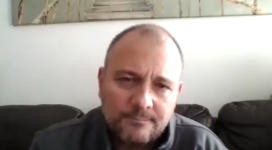Despite the avid efforts of gay-rights activists to forcefully halt the church trial of a lesbian pastor from commencing, the trial judge and jury entered the church to begin the proceedings with the words, "we are together as the gathered church ... the same church that worships ... the same church that is so bitterly and painfully divided."
The rare event, the first of its kind in 20 years, puts on trial Karen Dammann for performing “practices declared by the United Methodist Church to be incompatible with Christian teaching." She has pleaded not guilty of the charge.
Dammann’s trial is likely to have major repercussions throughout the church. Even before the trial, the United Methodists, the third largest denomination in the U.S. with some 8 million members, have been locked in a battle between those who accept homosexuality as a biblically acceptable way of life, and those who do not. Current UMC law mandates that ordained ministers refrain from homosexual acts.
The Rev. James Finkbeiner, arguing on behalf of the church, emphasized during the trial that the case is to determine whether Dammann violated church law.
“The practice of homosexuality is incompatible with Christian teaching, self-avowed practicing homosexuals are not to be accepted as candidates, ordained as ministers, or appointed to serve in the United Methodist Church,” began Rev. Finkbeiner.
Finkbeiner argued that Dammann has already provided "self-avowed" evidence that she is a "practicing" homosexual — first in a 2001 letter to her Bishop Elias Galvan saying she was in a "partnered, covenanted, homosexual relationship," and then in a 2002 statement that her relationship with her partner of about nine years did indeed involve sexual contact.
"It is not the law of the church on trial today," Finkbeiner said. "Your job is to find her guilty or innocent (under present law). It is as simple as that."
Dammann’s defense team, along with the 100 pro-gay protestors outside the church, constantly veered toward ambiguous arguments, stating “social and civil rights.” They argued that the current church law banning actively homosexual individuals are not “in-line” with the context of today’s era. Comparing homosexuality to divorce, one of Dammann’s supporters went so far as to say that the UMC is “acting as a hypocrite” for allowing people to remarry while prohibiting ministers from “being gay.”
Arguers on both sides agree that the result of the case, whatever it may be, will have a great impact on the future of the church.
According to Thomas Frank, director of Methodist Studies at Emory University’s Candlir School of Theology in Atlanta, the verdict is “bound to stir a lot of tension” when the quadrennial UMC general conference meets next month in Pittsburgh.
"If Dammann is found guilty, supporters of gay and lesbian civil rights will probably organize even stronger. And if she's acquitted, some people will say, 'If this isn't enough to expel a person from ministry, what is?',” said Frank.
The Rev. Rick Vinther, pastor of Woodinville Community United Methodist Church, who believes in church law as it stands on issues of homosexuality, says "the outcome of this trial has great impact for a lot of people on whether they're going to stay in the Methodist Church."
The trial is set to continue today, March 18, with the testimony of Seattle Bishop Galvan, who filed the complaint against Damman.







